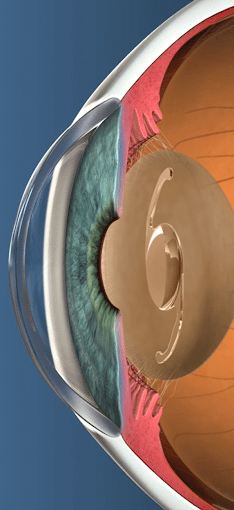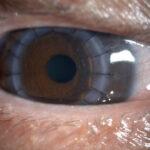Presbyopia is an age-related condition that makes it difficult to focus on close objects. Glasses-free options for this condition are available and becoming increasingly popular: Multifocal Intraocular Lenses (IOLs) and Presbyopic Implantable Phakic Collamer Lenses (PIPCLs). Both options aim to correct far, intermediate, and near vision without needing glasses or contact lenses.
What is a Presbyopic IPCL?
- Presbyopic IPCLs are lenses implanted inside the eye, between the iris and the natural crystalline lens. It is inserted without removing the crystalline lens. They could treat myopia (nearsightedness), astigmatism and presbyopia.

What is Multifocal IOL?
- Multifocal IOLs replace the natural crystalline lens during cataract surgery. These lenses have multiple focal points, allowing vision at various distances (far, intermediate, and near).

Key Differences Between Presbyopic IPCL and Multifocal IOL
Now that we have a basic understanding of both treatments, let’s dive into their key differences.
1. Procedure and Lens Placement
- Presbyopic IPCL: The PIPCL is inserted into the eye through a small incision of the cornea/ limbus. The crystalline lens remains intact. The lens is placed in front of the eye’s natural lens, making it a reversible procedure (the PIPCL can be removed or replaced if necessary).
- Multifocal IOL: This lens is implanted after the crystalline lens is removed, typically during cataract surgery. Once in place, it becomes a permanent part of the eye. The procedure is less reversible because the natural lens is no longer present.
2. Ideal Candidates
- Presbyopic IPCL: PIPCLs are ideal for patients aged 38 to 48 who have moderate to high myopia, astigmatism, and difficulty reading at a typical working distance of 35cm to 45cm. People who have thin corneas or are not candidates for LASIK may also benefit from PIPCLs.
- Multifocal IOL: Multifocal IOLs are ideal for patients over 50, particularly those who needed cataract removal surgery, or those suffering from presbyopia who want to eliminate the need for glasses or contacts.
3. Permanency and Flexibility
- Presbyopic IPCL: In rare situations such as a significant residual refractive error after implantation, the lenses can be removed. Should a person undergo cataract surgery later on, the PIPCL will be removed together with the cataractous crystalline lens. An IOL will then be implanted, which will treat the existing refractive errors.
- Multifocal IOL: The IOL is permanent once implanted, as the natural lens is removed. However, in rare conditions such as IOL dislocation, the dislocated IOL can be removed and replaced with a new IOL.
Which Option is Right for You?
The decision between Presbyopic IPCLs and Multifocal IOLs depends on several factors, including your age, eye health, lifestyle, and personal preferences/ expectation.
Choose a Presbyopic IPCL if:
- You’re younger and have a clear crystalline lens (not indicated for cataract surgery).
- You want to maintain more flexibility, as the lenses can be removed or replaced.
- You have refractive errors (nearsightedness and astigmatism) in addition to presbyopia.
Choose a Multifocal IOL if:
- You are older and undergoing cataract surgery.
- You want a long-term solution to presbyopia and don’t mind the permanence of the lens.
- You want to enjoy freedom of glasses for a wide range (far, intermediate, near).
Conclusion
Both Presbyopic IPCLs and Multifocal IOLs are excellent options for those with refractive errors and presbyopia. The best option for you will depend on your unique situation, including your age, overall eye health, and lifestyle needs. It’s essential to discuss your options with the ophthalmologists available in Bangsar South Kuala Lumpur, Cheras South, Puchong, Shah Alam, Seremban, Johor Bahru, Penang and Kuching to determine the most appropriate solution tailored to your vision correction needs. With the right choice, you can regain the clear, functional vision needed to enjoy daily life without the need for glasses or contacts.






